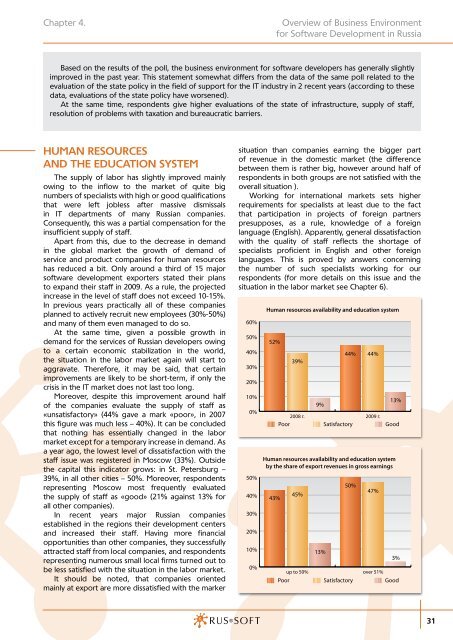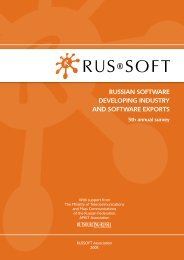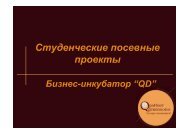russian software developing industry and software exports
russian software developing industry and software exports
russian software developing industry and software exports
Create successful ePaper yourself
Turn your PDF publications into a flip-book with our unique Google optimized e-Paper software.
Chapter 4.<br />
Overview of Business Environment<br />
for Software Development in Russia<br />
Based on the results of the poll, the business environment for <strong>software</strong> developers has generally slightly<br />
improved in the past year. This statement somewhat differs from the data of the same poll related to the<br />
evaluation of the state policy in the field of support for the IT <strong>industry</strong> in 2 recent years (according to these<br />
data, evaluations of the state policy have worsened).<br />
At the same time, respondents give higher evaluations of the state of infrastructure, supply of staff,<br />
resolution of problems with taxation <strong>and</strong> bureaucratic barriers.<br />
HUMAN RESOURCES<br />
AND THE EDUCATION SYSTEM<br />
The supply of labor has slightly improved mainly<br />
owing to the inflow to the market of quite big<br />
numbers of specialists with high or good qualifications<br />
that were left jobless after massive dismissals<br />
in IT departments of many Russian companies.<br />
Consequently, this was a partial compensation for the<br />
insufficient supply of staff.<br />
Apart from this, due to the decrease in dem<strong>and</strong><br />
in the global market the growth of dem<strong>and</strong> of<br />
service <strong>and</strong> product companies for human resources<br />
has reduced a bit. Only around a third of 15 major<br />
<strong>software</strong> development exporters stated their plans<br />
to exp<strong>and</strong> their staff in 2009. As a rule, the projected<br />
increase in the level of staff does not exceed 10-15%.<br />
In previous years practically all of these companies<br />
planned to actively recruit new employees (30%-50%)<br />
<strong>and</strong> many of them even managed to do so.<br />
At the same time, given a possible growth in<br />
dem<strong>and</strong> for the services of Russian developers owing<br />
to a certain economic stabilization in the world,<br />
the situation in the labor market again will start to<br />
aggravate. Therefore, it may be said, that certain<br />
improvements are likely to be short-term, if only the<br />
crisis in the IT market does not last too long.<br />
Moreover, despite this improvement around half<br />
of the companies evaluate the supply of staff as<br />
«unsatisfactory» (44% gave a mark «poor», in 2007<br />
this figure was much less – 40%). It can be concluded<br />
that nothing has essentially changed in the labor<br />
market except for a temporary increase in dem<strong>and</strong>. As<br />
a year ago, the lowest level of dissatisfaction with the<br />
staff issue was registered in Moscow (33%). Outside<br />
the capital this indicator grows: in St. Petersburg –<br />
39%, in all other cities – 50%. Moreover, respondents<br />
representing Moscow most frequently evaluated<br />
the supply of staff as «good» (21% against 13% for<br />
all other companies).<br />
In recent years major Russian companies<br />
established in the regions their development centers<br />
<strong>and</strong> increased their staff. Having more financial<br />
opportunities than other companies, they successfully<br />
attracted staff from local companies, <strong>and</strong> respondents<br />
representing numerous small local firms turned out to<br />
be less satisfied with the situation in the labor market.<br />
It should be noted, that companies oriented<br />
mainly at export are more dissatisfied with the marker<br />
situation than companies earning the bigger part<br />
of revenue in the domestic market (the difference<br />
between them is rather big, however around half of<br />
respondents in both groups are not satisfied with the<br />
overall situation ).<br />
Working for international markets sets higher<br />
requirements for specialists at least due to the fact<br />
that participation in projects of foreign partners<br />
presupposes, as a rule, knowledge of a foreign<br />
language (English). Apparently, general dissatisfaction<br />
with the quality of staff reflects the shortage of<br />
specialists proficient in English <strong>and</strong> other foreign<br />
languages. This is proved by answers concerning<br />
the number of such specialists working for our<br />
respondents (for more details on this issue <strong>and</strong> the<br />
situation in the labor market see Chapter 6).<br />
60%<br />
50%<br />
40%<br />
30%<br />
20%<br />
10%<br />
0%<br />
50%<br />
40%<br />
30%<br />
20%<br />
10%<br />
0%<br />
Human resources availability <strong>and</strong> education system<br />
52%<br />
43%<br />
39%<br />
2008 г.<br />
Poor<br />
45%<br />
up to 50%<br />
Poor<br />
9%<br />
13%<br />
44%<br />
Satisfactory<br />
50%<br />
Satisfactory<br />
44%<br />
2009 г.<br />
47%<br />
13%<br />
Good<br />
Human resources availability <strong>and</strong> education system<br />
by the share of export revenues in gross earnings<br />
3%<br />
over 51%<br />
Good<br />
31








